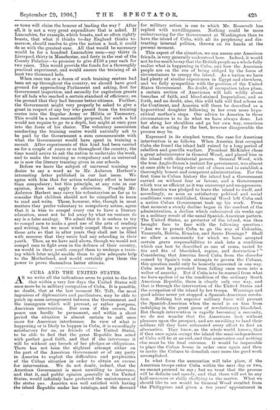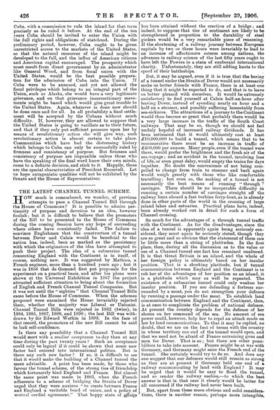CUBA AND THE 1J1ITED STATES.
ASwe write all the indications seem to point to the fact that within a very few days the United States will once more be in military occupation of Cuba. It is possible, no doubt, that at the last moment Mr. Taft, the most ingenious of diplomatists and pacificators, may be able to patch up some arrangement between the Government and the insurgents which will prevent, or rather postpone, American intervention. But even if this occurs, the peace can hardly be permanent, and within a short period the situation is almost certain to call once more for American interference. In view of what is happening or is likely to happen in Cuba, it is exceedingly satisfactory for us, as friends of the -United States, to be able to feel that the great Republic has acted with perfect good faith, and that if she intervenes it will be without any breach of her pledges or obligations. There has not been the slightest attempt either on the part of the American Government or of any party in America to exploit the difficulties and perplexities of the Cuban situation in order to obtain an excuse for intervention. We do not doubt, indeed, that the American Government is most unwilling to intervene, and that it, and public opinion generally in the United States, would infinitely have ,preferred the maintenance of the status quo. America was well satisfied with having the island Republic under her tutelage, and the demand for military action is one to which Mr. Roosevelt. has replied with unwillingness. Nothing could be more embarrassing for the Government at Washington than to have the island of Cuba, with all its perplexing and dis- tracting internal politics, thrown on its hands at the present moment. - This aspect of the situation, we can assure our American friends, is very generally understood here. Indeed, it would not be too much to say that the British people as a whole fully realise what is happening in Cuba, and bow the American people are on the eve of being obliged by the force of circumstances to occupy the island. As a nation we have had plenty of similar experiences in Egypt and elsewhere, and we fully sympathise with the position of the United States Government. No doubt, if occupation takes place, a certain section of Americans will talk wildly about breaches of faith, and blood-stained Imperialism, and so forth, and no doubt, also, this wild talk will find echoes on the Continent, and America will there be described as a hypocritical daughter following in her even more hypo- critical mother's steps. Our advice to America in these circumstances is to do what we have always done. Let her shrug her shoulders and go her own way, conscious that she is acting for the best, however disagreeable the process may be.
Expressed in its simplest terms, the case for American intervention is as follows. When America first occupied Cuba she found the island half ruined by a long period of rebellion and. guerilla warfare. President McKinley chose a great administrator in General Wood, and placed him in the island with dictatorial powers. General Wood, with the true Anglo-Saxon's instinct for government, was almost at once able to bring order out of chaos and to establish a thoroughly honest and competent administration. For the first time in Cuban history the island had a Government carried. on without fear or favour, and a Government which was as efficient as it was uncorrupt and unoppressive. But America was pledged to leave the island to itself, and accordingly, as soon as satisfactory political and social conditions were established, General Wood left Cuba and a. native Cuban Government took up his work. From that moment a steady decline began in the conduct of the administration, a decline which culminated six weeks ago in a military revolt of the usual Spanish-American pattern. The United States, as protector of the island, was thus brought face to face with the following question : "Are we to permit Cuba to go the way of Colombia, Venezuela, Bolivia, Ecuador, and Santo Domingo ? Shall we allow a community for which we have accepted certain grave responsibilities to sink into a condition which can best be described as one of coma, varied by fits and fits of bloodshed, rapine, and. destruction ? Considering that America freed Cuba from the disorder caused by Spain's vain attempts to govern the Cubans, this question could only be honestly answered in one way. Cuba must be prevented from falling once more into a welter of anarchy. But if Cuba is to be rescued from what we have spoken of as the condition of the ordinary South American Republic, there is clearly only one way, and that is through the intervention of the United States and the occupation of the island by her troops. Warnings and good advice never yet stopped a Spanish-American revolu- tion. Nothing but superior military force will prevent the Spanish-American when the mood is on him from indulging in the great game of revolutionary bloodshed. But though intervention is rapidly becoming a necessity, we do not wonder that the Americans look without pleasure upon the prospect, and are unwilling to land their soldiers till they have exhausted every effort to find an alternative. They know, as the whole world knows, that if they once again occupy the island the semi-independence of Cuba will be at an end, and that, annexation and nothing else must be the final outcome. It would be impossible to place the Cuban house in order once again and then to invite the Cubans to demolish once more the good work accomplished.
In what form the annexation will take place, if the American troops enter Cuba within the next day or two, we cannot pretend to say ; but we trust that the process will be definite and speedy, and. that there will not be any half-measures or shillyshallying in the matter. What we should like to see would be General Wood recalled. from the Philippines and given a ten years' appointment in Cuba, with a commission to rule the island for that term precisely as he ruled it before. At the end of the ten years Cuba should be invited to enter the Union with the full rights and obligations of statehood. During the preliminary period, however, Cuba ought to be given unrestricted access to the markets of the United States, so that the natural resources of the island might be developed to the full, and the influx of American citizens and American capital encouraged. The prosperity which must result from direct government by an administrator like General Wood, and from fiscal union with the United States, would be the best possible prepara- tion for the admission of Cuba into the Union. If Cuba were to be annexed, and yet not allowed the 'fiscal privileges which belong to an integral part of the Union, such as Alaska, she would have a very legitimate grievance, and on that grievance insurrectionary move- ments might be based which would give great trouble to the United States. Again, whatever is done now should be done once and for all. In all probability a final settle- ment will be accepted by the Cubans without much difficulty. If, however, they are allowed to suppose that the United States is going to vacillate as to their future, and that if they only put sufficient pressure upon her by means of revolutionary action she will give way, such revolutionary action is almost certain to take place. Communities which have had the distressing history which belongs to Cuba can only be successfully ruled by firmness and consistency of purpose. But firmness and. consistency of purpose are impossible unless those who 'have the speaking of the final word know their own minds, come to a definite decision, and stick to it. Happily, these Are the special characteristics of President Roosevelt. Let us hope antagonistic qualities will not be exhibited by the Senate and the House of Representatives.











































 Previous page
Previous page